How Can I Make My Conservatory Usable All Year Round?
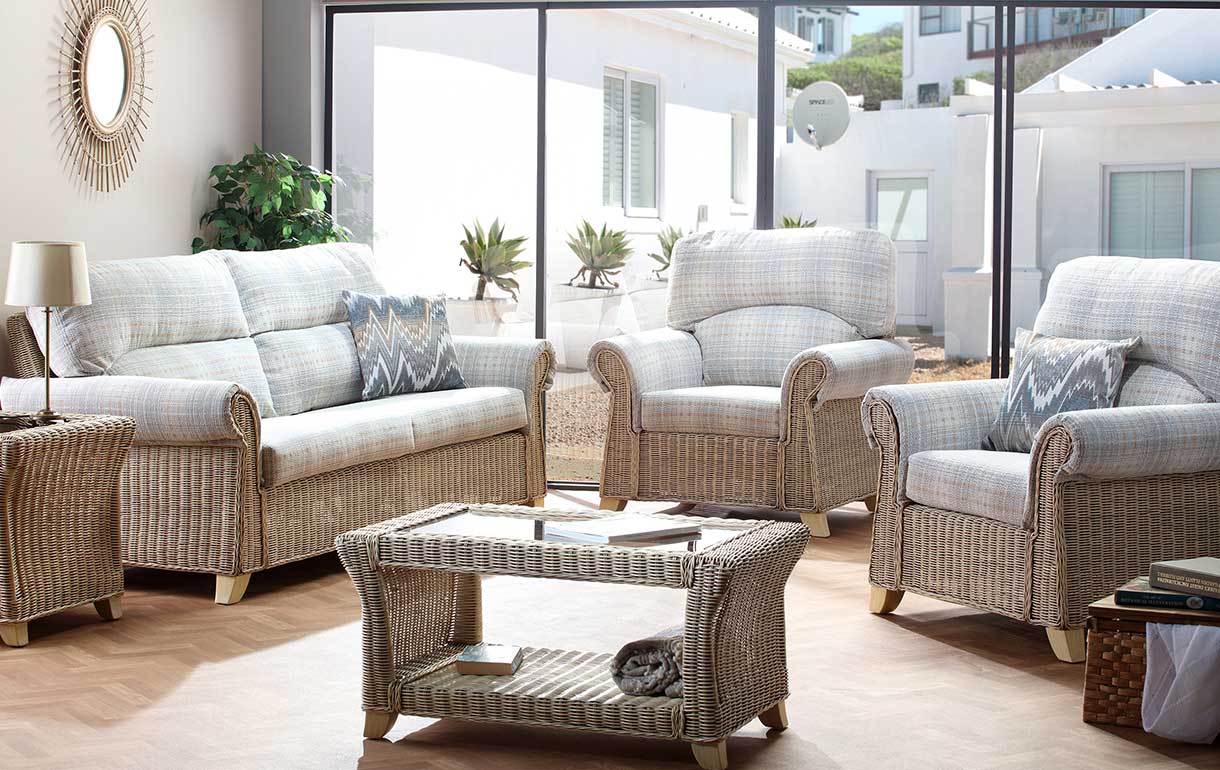
Guide Updated: 17/10/25
Many homeowners ask how to make their conservatory usable all year round. The key is to manage the change in temperature to keep the space comfortable throughout summer and winter. Having a conservatory is such an amazing mood-enhancer that using it all year round makes perfect sense to us and our customers.
As the seasons begin to change, many people stop using their conservatories, and we think this is wasted potential. With a few tweaks, you can take advantage of your conservatory all year round.
In this blog, we look at the different ways you can make your conservatory a year-round sanctuary, both in terms of winter-warmth and summer cool-down.
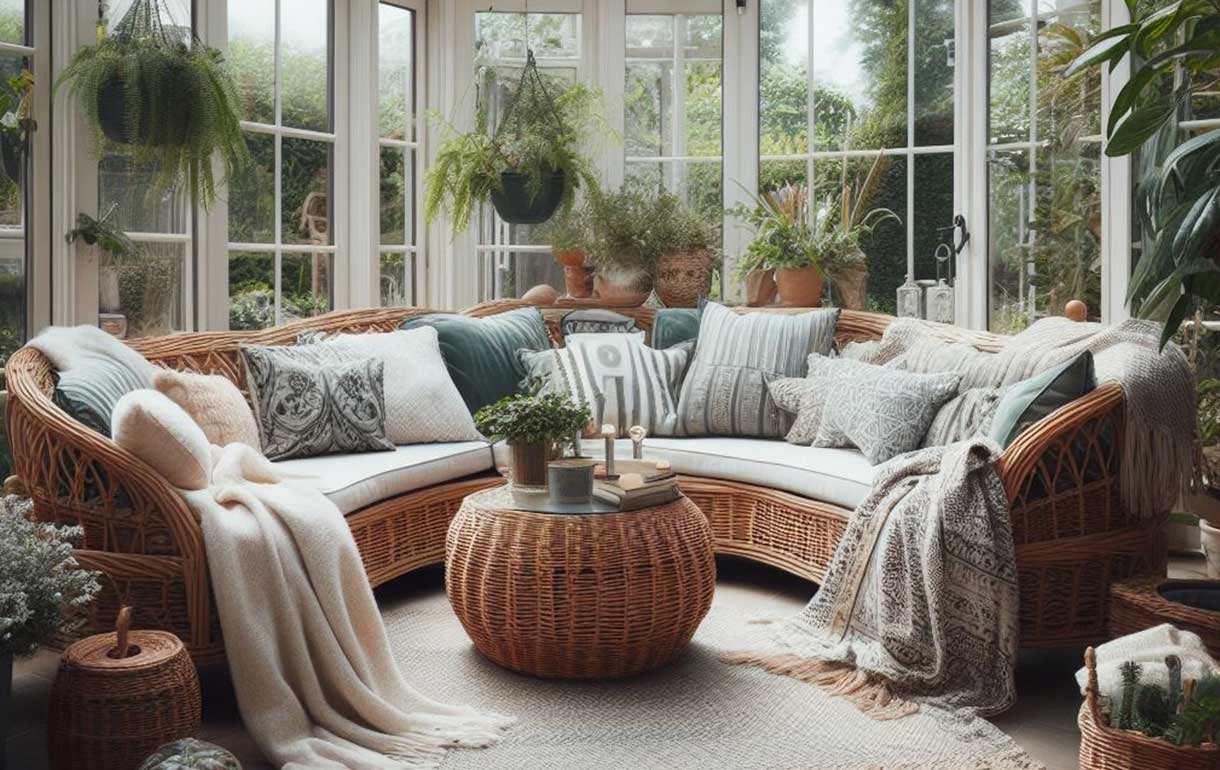
Can you turn a conservatory into an extension without planning permission?
Turning your conservatory into a proper room, maybe for guests to stay overnight, is a popular move. You may need planning permission if you want to make significant structural changes to your conservatory. For example:
1. To replace the roof from glass to tile changes the nature of the structure from a conservatory to a single-storey extension. Assuming the original conservatory meets all the requirements for permitted development (eg doesn’t extend beyond 3-4m), you won’t need planning permission. But, the roof must meet the prevalent building regulations.
2. If you wish to install a radiator that’s connected with the rest of your house, you will need to satisfy building regulations. This doesn’t apply to a standalone (eg portable) heater.
For up to date information and reassurance, we recommend you seek clarification from your local authority before taking any action.
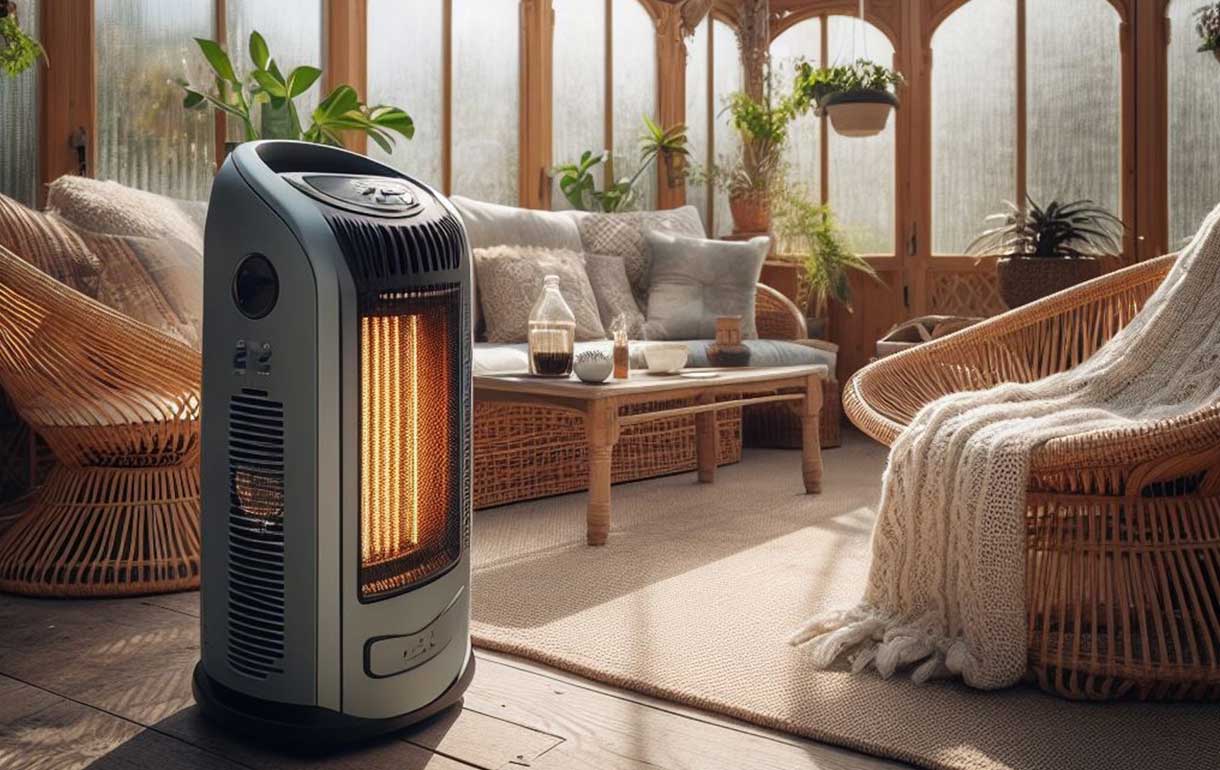
How can I make my conservatory warmer in winter?
There are a number of conservatory ideas you can add to make your conservatory warmer in winter - from radiators to rugs and conservatory cushions. We divide this into ‘active’ and ‘passive’ measures:
Active measures to make your conservatory warmer
A reliable source of heat is obviously the most effective: underfloor heating, radiators or portable heaters, etc. You will need to consider the size and nature of your space. If your conservatory is small, a heating option that’s either discreet (under-floor heating, for example) or at least temporary, such as a portable heater, is probably best. If you do go for a radiator connected to the heating system in your house, please remember to check those building regulations.
Insulating your conservatory is a very important step towards making your conservatory usable all year round. Insulation helps regulate the temperature, allowing you to enjoy the conservatory in those colder months. A few options to consider would be double or triple-glazed windows, insulated roof panels and draft proofing.
If your conservatory is older, it might be time to upgrade the glass. Newer options have more efficient glazing, which keeps your conservatory cool in summer and warm in winter. Double glazing is a popular, more cost-effective option. Double glazing is when two panes of glass are installed with a gap in between; this will help to keep the heat in your conservatory during winter.
Passive ideas for a warmer conservatory
It makes sense to take advantage of the sun’s strength as well as any warmth coming from the rest of your house. If your conservatory is glass-roofed and south-facing, then it will be reasonably warm enough to relax throughout the year (your heat-seeking pet will confirm this). You can help keep the cold out with draught excluders and conservatory rugs, together with thermal window blinds and curtains. Then, add blankets and the aforementioned pet on your lap.
Check out our top tips below:
• Energy Efficiency - Combining well-insulated glazing and targeted heating guarantees your conservatory stays warm without significantly increasing your energy bills
• Smart Thermostat Controls - Where possible, take advantage of smart thermostats or timers
• Safety - Be mindful of where you place your portable heater, keep it away from curtains or furniture and never leave it unattended
• Thermal Blinds - Thermal blinds or window films are a great way to keep heat in the room
• Seal Gaps - Check that all doors and windows are properly sealed; even the smallest gap can let the cold in
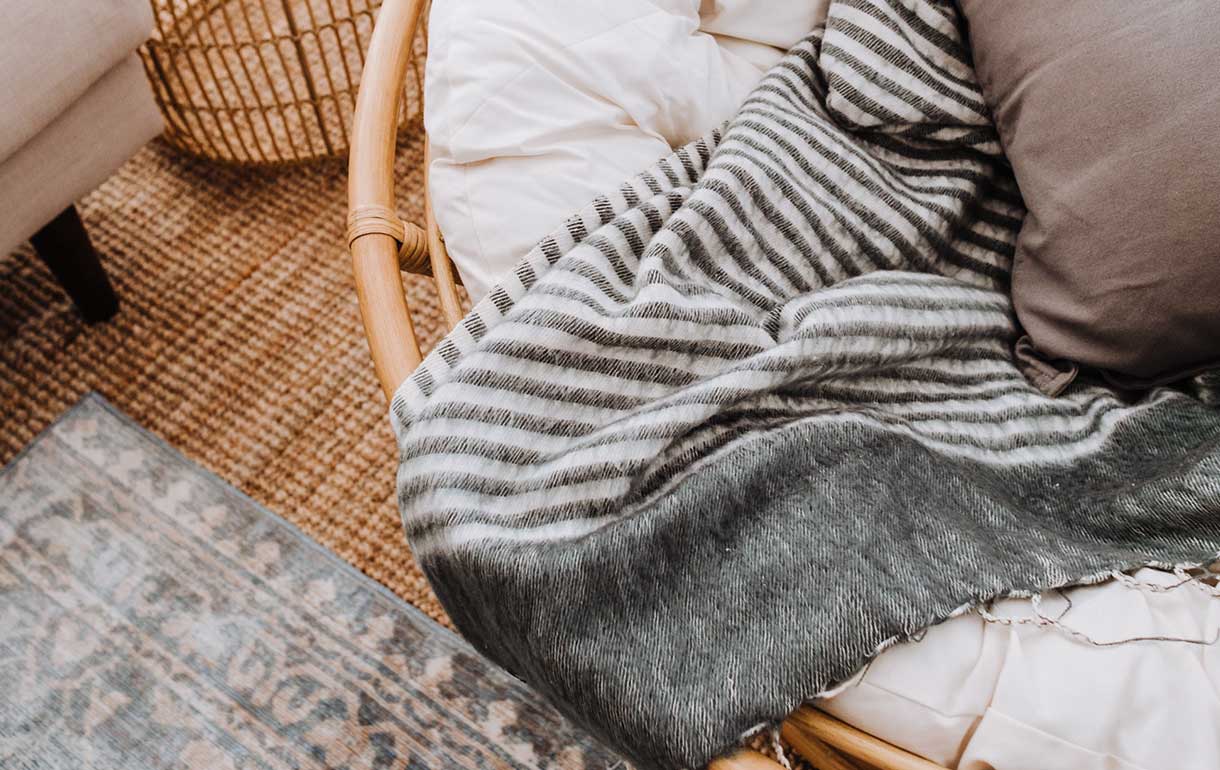
How can I heat my conservatory in the winter cheaply?
If you are planning to use your conservatory in the winter, you’ll probably need a reliable source of heat. This will also help with the heating efficiency of the rest of your house because the system won’t have to work so hard at warming up a permanently cold ‘room’.
The option with the least initial cost is to buy infrared heaters or panels. In heating objects rather than air, they instantly warm you up while consuming less electricity.
At the other end of the scale, having a conservatory with lots of window glazing but a solid, insulated roof will significantly reduce heat demand. Portable heating, or radiators using the main house heating system, would further improve your level of comfort. Of course, you will have all the associated building costs, but longer term, your energy efficiency will be much improved.
Consider Insulation Improvements
To truly maximise your conservatory's usability throughout the year, consider enhancing its insulation. Upgrading to high-performance double or triple glazing can significantly improve thermal efficiency, helping to keep heat in during winter and out during summer. We have briefly mentioned thermal blinds to improve heat loss. If you are upgrading your window glazing, then you could complement this with thermal curtains or thermal blinds. Additionally, insulating the walls and roof can create a more stable indoor environment, making it easier to maintain your desired temperature without over-relying on heating or cooling systems.
Cold floors are a major source of heat loss, to combat this, consider insulating your flooring. For a more cost-effective alternative, adding rugs can improve comfort and reduce heat loss.
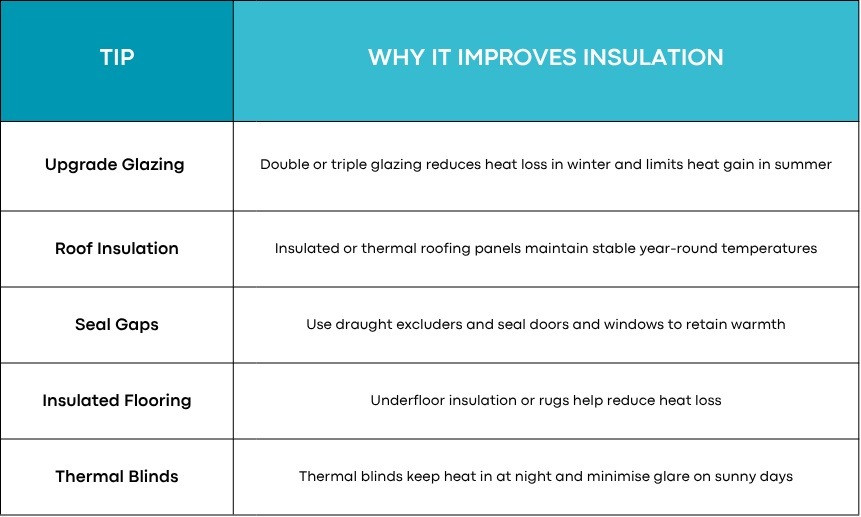
Reliable Roofing
Roofing plays a crucial role in keeping your conservatory warm. Traditionally made of glass, modern conservatory roofs now come in a variety of materials, including polycarbonate, solid tiles, and even advanced insulated roofing systems.
Each option offers distinct advantages: glass provides excellent natural light. Still, it may require insulation to prevent overheating in summer or excessive cooling in winter, while polycarbonate is lightweight and cost-effective. Solid and insulated roofs, on the other hand, offer better thermal control and noise reduction, transforming the conservatory into a space that can be used comfortably throughout the year.
Conservatory roofing not only defines the look and feel of the conservatory but also significantly impacts its functionality and comfort.
A closer look at soft furnishings
Adding soft furnishings can create a cosy and inviting atmosphere in any conservatory. As previously mentioned, rugs can add some extra warmth. Scatter cushions and blankets are also great ways to bring warmth into a room.
Add a few cushions and a throw to your conservatory sofa or armchair to create an inviting retreat. These soft furnishings can be beneficial in between the seasons. Blankets provide extra warmth and can be used during autumn and winter months.
Rugs are a practical and stylish addition to your conservatory. Conservatories are known for having cold floors, rugs eliminate this issue. The addition of a soft rug instantly makes a space feel warmer.
As we say goodbye to summer this is the time to get cosy in your conservatory, grab a throw and a cushion and curl up. Then equally soft furnishings can be neatly stored or folded away as the temperature begins to rise.
How do I keep my conservatory condensation-free?
Condensation (droplets of water on the windows) is caused by the difference in temperature between the inside and outside. Reducing the moisture levels in your conservatory is key and there are a number of steps that you can take:
Double glaze your windows: the air gap between the two panes of glass helps to keep the inner one nearer to room temperature thereby reducing condensation.
Don’t close your conservatory off from the rest of the house: keeping your conservatory doors open will allow air to flow around your home, keeping moisture levels down.
Don’t dry clothes in the conservatory: the moisture from your clothes will increase the humidity in the room and increase condensation. If you want to do this we would recommend not doing this for prolonged periods of time.
Keep humidity-reducing plants in your conservatory: some plants will increase condensation in your conservatory so choose those that actively absorb water in the air, such as orchids, ivy and ferns.
Leave your windows in the vent position: the additional air circulation will reduce the humidity levels inside your conservatory. (To be on the safe side, make sure you close the vents at night and when you leave the house unattended.)
Buy an air dehumidifier: if you still have problems with condensation, then a dehumidifier might be the answer. Relatively inexpensive, dehumidifiers are highly effective at reducing moisture levels in the air.
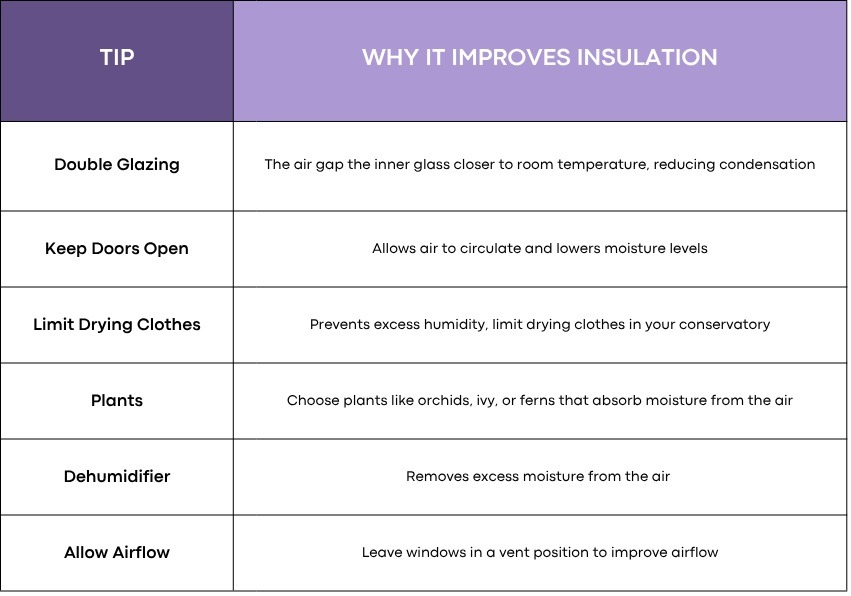
How do I keep my conservatory cool in summer?
So many of the above heating ideas are also useful to keep it cool in the warmer months:
• A tiled roof will be cooler than glass
• Keep the doors into the house open to ensure the hot air isn’t trapped in the conservatory
• Shut blinds and draw the curtains to keep out the heat of sun
• Leave windows open or in the vent position
• Turn the heating off
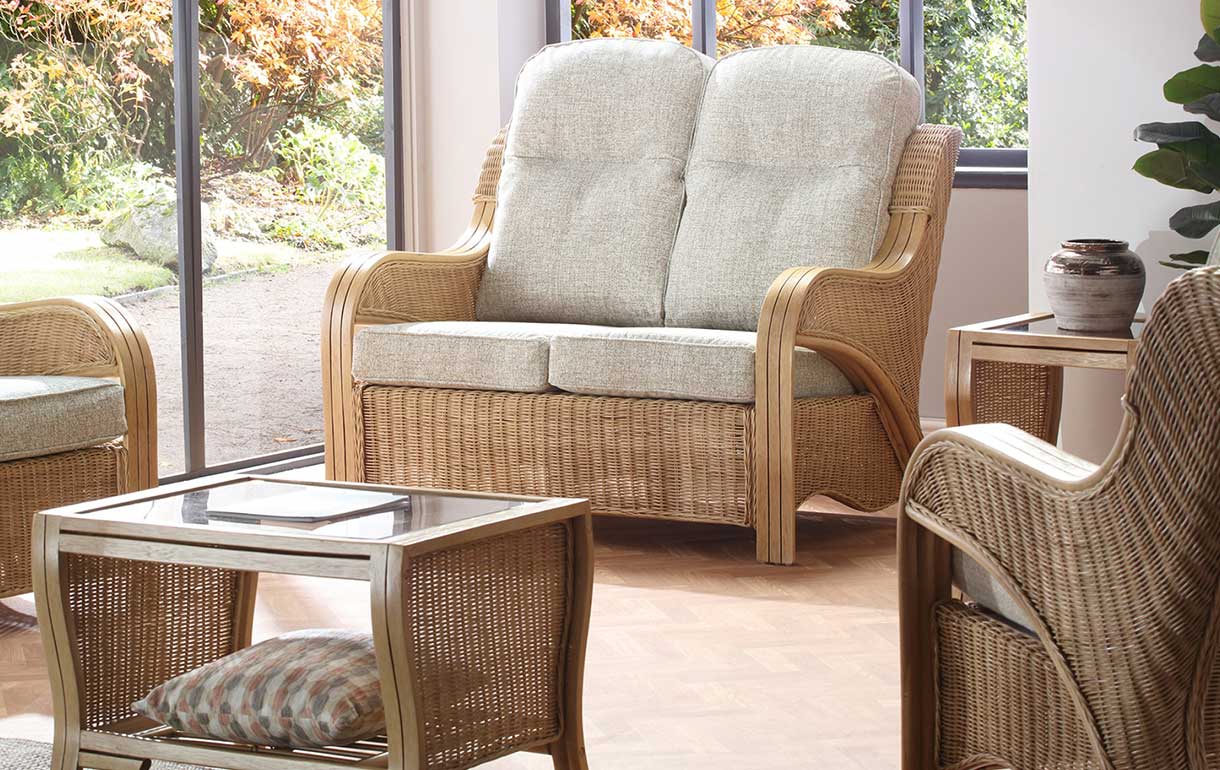
A conservatory isn’t just for summer!
If you’ve invested in making your conservatory a relaxing and inspiring space, you’ll want to keep using it all year round. The right heating solution, good air flow, reducing condensation and cosy furniture for conservatories are key elements to bear in mind. Then you’re ready to plan all-year dining and relaxing in your conservatory with our range of traditional and modern furniture and accessories.
Incorporate Smart Technology
Investing in smart home technology can greatly enhance the comfort and functionality of your conservatory. Smart thermostats allow for precise temperature control, while automated blinds can help regulate sunlight and heat throughout the day.
Automated blinds can be a game changer in managing the sunlight and heat in your conservatory. They can be programmed to open and close based on the time of day or the sun's position, providing shade during peak sunlight hours to keep the space cool. In colder months, you can set them to close during the evening to retain warmth.
Smart thermostats allow you to precisely control the temperature. With features like remote access through smartphone apps, you can adjust the temperature from anywhere, ensuring your conservatory is always comfortable when you arrive.
By investing in these technologies, you can create a conservatory that is not only more comfortable but also adaptable to your lifestyle as the seasons change.
By implementing the strategies discussed - from heating solutions to the use of smart technology - you can transform your conservatory into a versatile space that enhances your conservatory’s comfort and usability. Whether it’s a bright summer retreat or a warm winter haven, investing time and effort into these improvements will allow you to fully enjoy your conservatory throughout the seasons. Embrace the possibilities, and make your conservatory a cherished part of your home for years to come!
--------------------
Have further questions about our conservatory furniture? Our friendly, knowledgeable team are always on hand to help, just give us a call or visit one of our showrooms in Wakefield or Newcastle.
About the Author

Chloe Shaw is a Garden Furniture & Conservatory Furniture Specialist with many years of experience working at JB Furniture. Chloe combines her deep knowledge of garden furniture trends with her talent for creating engaging and informative content. She loves sharing inspiration, design tips, and product insights to help readers transform their gardens and conservatories into beautiful and inviting retreats.












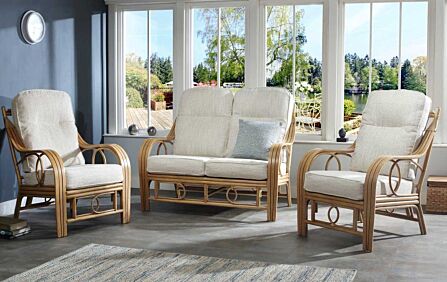
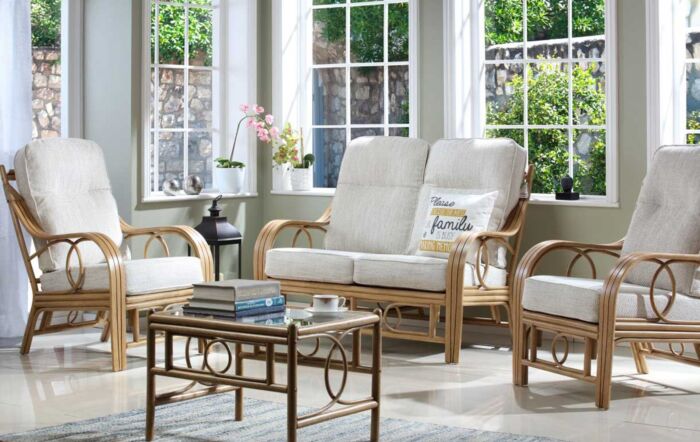
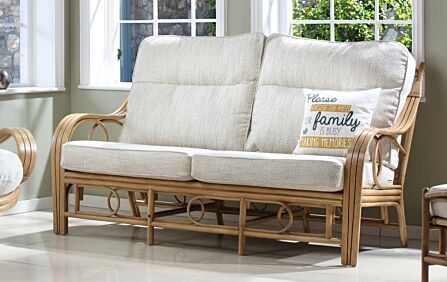
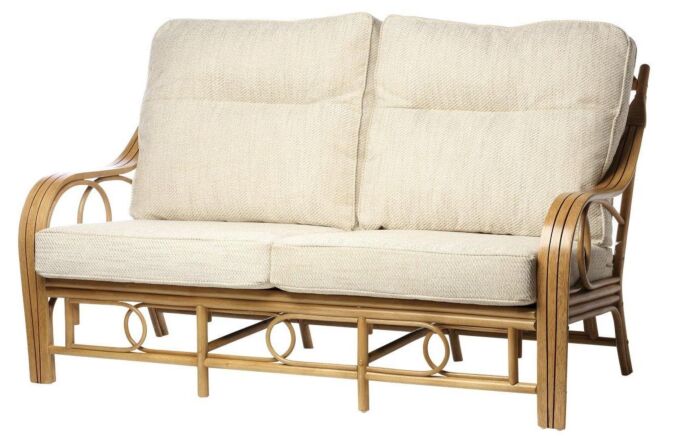
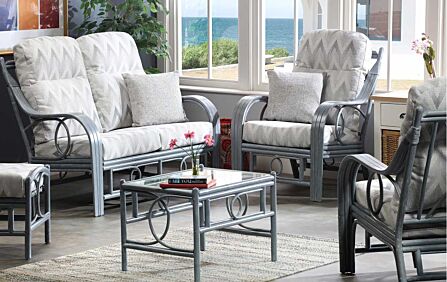
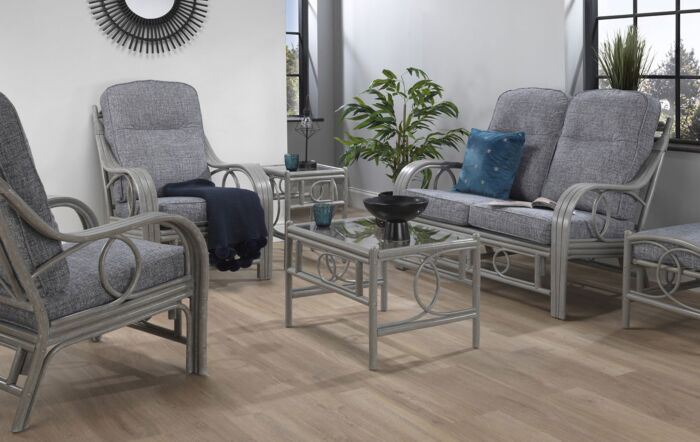
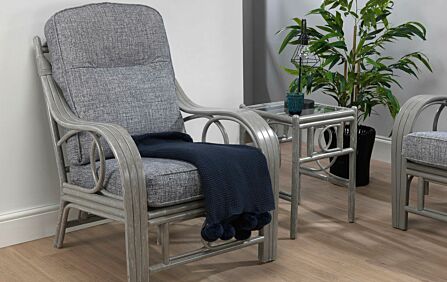
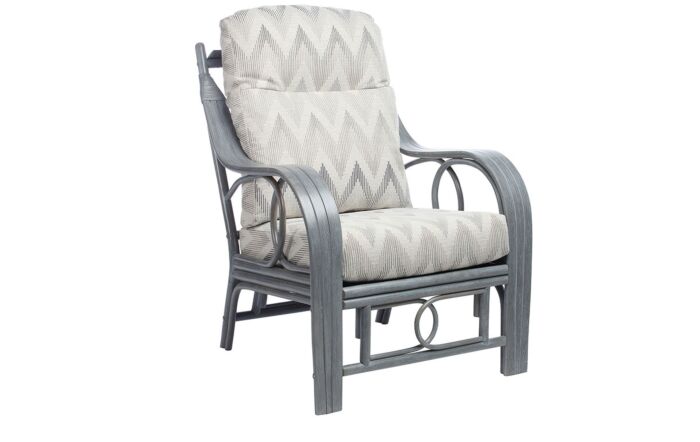
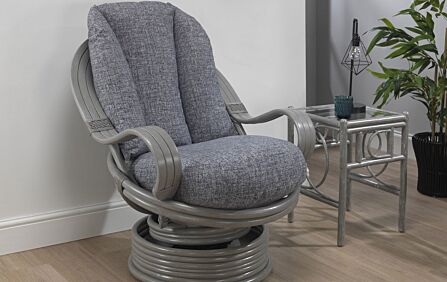
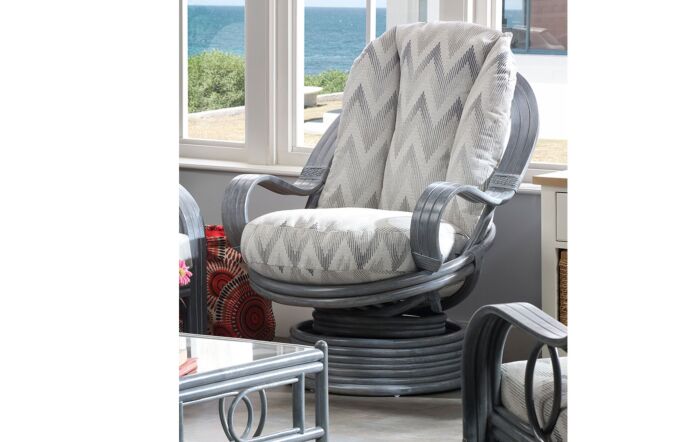
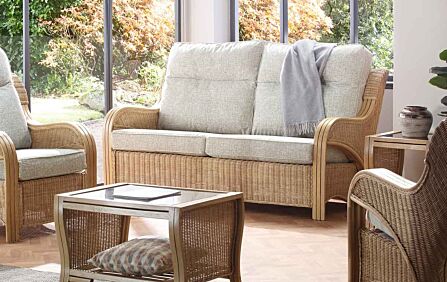
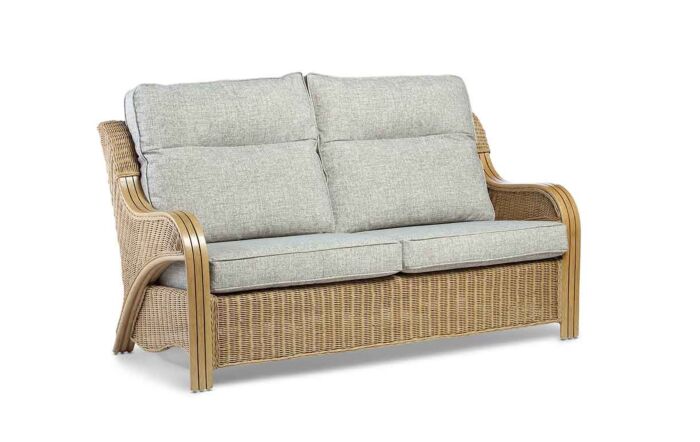
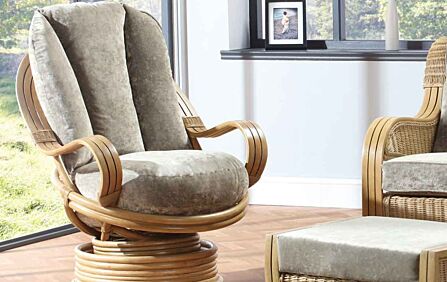

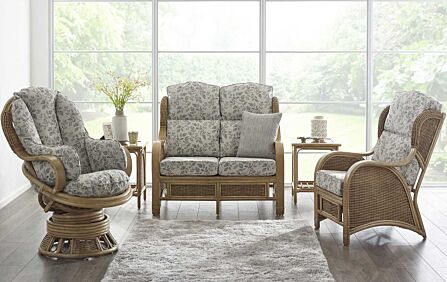
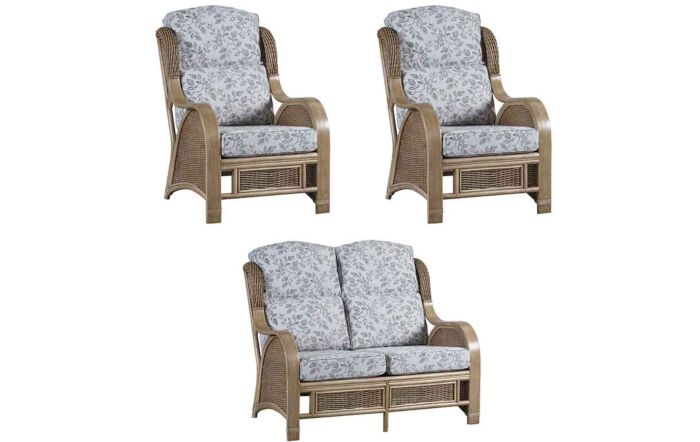
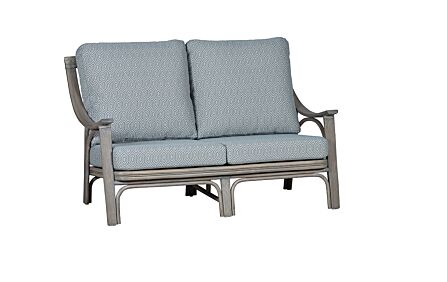
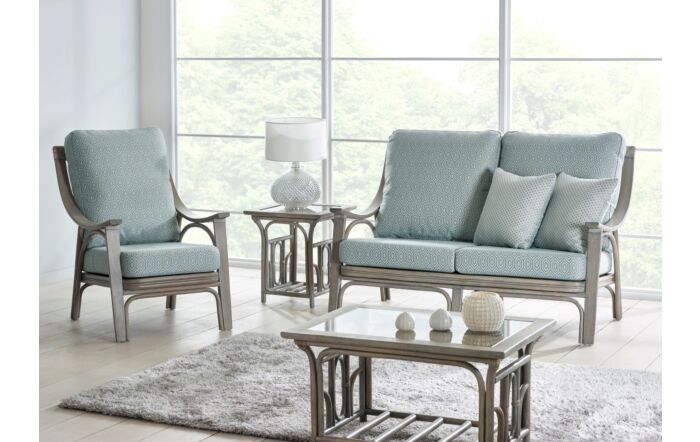
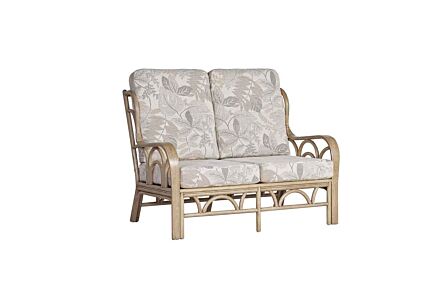
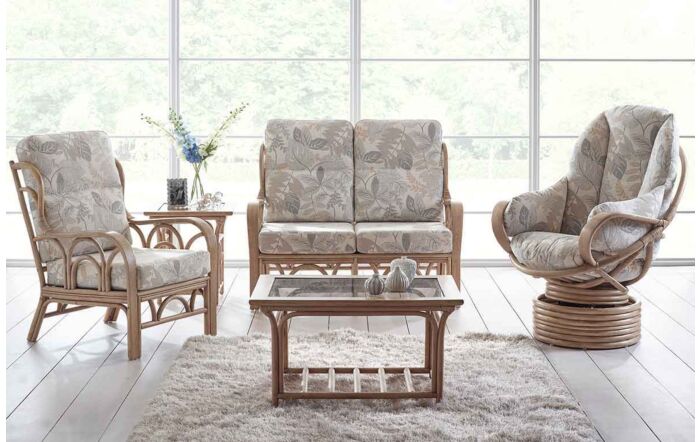
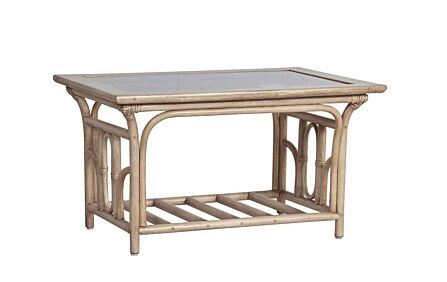

Login and Registration Form